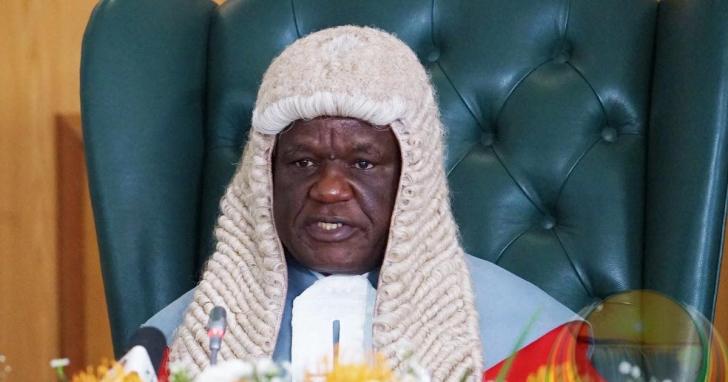News / National
Chief Justice Malaba says democracy depends on public trust in courts
13 Jan 2025 at 17:26hrs |
0 Views

Zimbabwe's Chief Justice Luke Malaba has called for stronger collaboration among stakeholders to build public confidence in the judiciary, emphasizing this as essential for sustaining democracy and upholding constitutionalism.
Speaking during the national opening of the 2025 legal year, held for the first time at the Bulawayo High Court on Monday, Malaba underscored the judiciary's accountability to the public, noting that public trust cannot be cultivated "in isolation."
"Achieving the delivery of quality justice is possible only through collaboration and partnership with all stakeholders within the justice sector," he said. "The conduct and manner in which each public institution carries out its mandate directly influences the level of confidence the public places in it."
The Chief Justice outlined the judiciary's theme for 2025: "Building Public Confidence in the Judiciary through Multi-Stakeholder Participation." He said this focus aligns with the Judicial Service Commission's (JSC) broader vision of delivering people-centered justice that reflects the values and aspirations of Zimbabweans.
"This theme serves to strengthen and refocus the judiciary and all stakeholders, urging us to channel our efforts into building public confidence not only in the judiciary but in all institutions within the justice sector," Malaba said.
He added that public confidence hinges on the judiciary's efficiency, fairness, and impartiality in adhering to the rule of law and protecting human rights.
Chief Justice Malaba emphasized the judiciary's reliance on public trust, citing Section 162 of the Constitution, which states that judicial authority is derived from the people of Zimbabwe.
"The judiciary's authority to perform its constitutional mandate is drawn from the public. Consequently, it is inherent that the judiciary must be accountable to the public," he said.
Malaba highlighted the JSC's initiatives to enhance accountability, including the Performance Management System, which monitors the efficiency of courts and judicial officers, ensuring prompt case finalization and minimizing case backlogs.
Reflecting on the judiciary's 2024 theme, "The Role of the Judiciary in Entrenching Constitutionalism," Malaba noted that significant strides had been made to promote constitutional compliance across the justice system.
"Building on this foundation, the Commission's efforts throughout 2024 remained focused on promoting constitutionalism within the judiciary," he said.
Malaba commended the JSC's decision to host the opening of the legal year in Bulawayo, aligning with the government's National Development Strategy (NDS) 1, which emphasizes the devolution of public services.
"This move symbolizes the judiciary's commitment to bringing services closer to the people, promoting inclusivity, and reinforcing public trust," he said.
The Chief Justice urged stakeholders, including judges, magistrates, and public officials, to uphold their constitutional obligations with fairness, transparency, and accountability.
"Every action and decision made by the courts must ultimately receive the endorsement of the public. This means that the judiciary's overall performance is subject to the evaluation of the people of Zimbabwe," he said.
The event was attended by legal practitioners, city officials, politicians, and other stakeholders, marking the beginning of a legal year focused on enhancing trust and fostering collaboration within Zimbabwe's justice system.
Speaking during the national opening of the 2025 legal year, held for the first time at the Bulawayo High Court on Monday, Malaba underscored the judiciary's accountability to the public, noting that public trust cannot be cultivated "in isolation."
"Achieving the delivery of quality justice is possible only through collaboration and partnership with all stakeholders within the justice sector," he said. "The conduct and manner in which each public institution carries out its mandate directly influences the level of confidence the public places in it."
The Chief Justice outlined the judiciary's theme for 2025: "Building Public Confidence in the Judiciary through Multi-Stakeholder Participation." He said this focus aligns with the Judicial Service Commission's (JSC) broader vision of delivering people-centered justice that reflects the values and aspirations of Zimbabweans.
"This theme serves to strengthen and refocus the judiciary and all stakeholders, urging us to channel our efforts into building public confidence not only in the judiciary but in all institutions within the justice sector," Malaba said.
He added that public confidence hinges on the judiciary's efficiency, fairness, and impartiality in adhering to the rule of law and protecting human rights.
Chief Justice Malaba emphasized the judiciary's reliance on public trust, citing Section 162 of the Constitution, which states that judicial authority is derived from the people of Zimbabwe.
"The judiciary's authority to perform its constitutional mandate is drawn from the public. Consequently, it is inherent that the judiciary must be accountable to the public," he said.
Reflecting on the judiciary's 2024 theme, "The Role of the Judiciary in Entrenching Constitutionalism," Malaba noted that significant strides had been made to promote constitutional compliance across the justice system.
"Building on this foundation, the Commission's efforts throughout 2024 remained focused on promoting constitutionalism within the judiciary," he said.
Malaba commended the JSC's decision to host the opening of the legal year in Bulawayo, aligning with the government's National Development Strategy (NDS) 1, which emphasizes the devolution of public services.
"This move symbolizes the judiciary's commitment to bringing services closer to the people, promoting inclusivity, and reinforcing public trust," he said.
The Chief Justice urged stakeholders, including judges, magistrates, and public officials, to uphold their constitutional obligations with fairness, transparency, and accountability.
"Every action and decision made by the courts must ultimately receive the endorsement of the public. This means that the judiciary's overall performance is subject to the evaluation of the people of Zimbabwe," he said.
The event was attended by legal practitioners, city officials, politicians, and other stakeholders, marking the beginning of a legal year focused on enhancing trust and fostering collaboration within Zimbabwe's justice system.
Source - cite
Join the discussion
Loading comments…




























